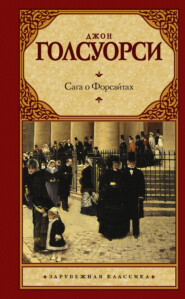По всем вопросам обращайтесь на: info@litportal.ru
(©) 2003-2025.
✖
Saint's Progress
Настройки чтения
Размер шрифта
Высота строк
Поля
“Tell me – everything,” he said; “for God’s sake!”
He saw her lips moving, and caught the murmur: “There ‘s nothing more. Gratian and George know, and Leila. It can’t be undone, Daddy. Perhaps I wouldn’t have wanted to make sure, if you hadn’t tried to stop Cyril and me – and I’m glad sometimes, because I shall have something of his – ” She looked up at him. “After all, it’s the same, really; only, there’s no ring. It’s no good talking to me now, as if I hadn’t been thinking of this for ages. I’m used to anything you can say; I’ve said it to myself, you see. There’s nothing but to make the best of it.”
Her hot hand came out from under the bedclothes, and clutched his very tight. Her flush had deepened, and her eyes seemed to him to glitter.
“Oh, Daddy! You do look tired! Haven’t you been to bed? Poor Daddy!”
That hot clutch, and the words: “Poor Daddy!” brought tears into his eyes. They rolled slowly down to his beard, and he covered his face with the other hand. Her grip tightened convulsively; suddenly she dragged it to her lips, kissed it, and let it drop.
“Don’t!” she said, and turned away her face.
Pierson effaced his emotion, and said quite calmly:
“Shall you wish to be at home, my dear, or to go elsewhere?”
Noel had begun to toss her head on her pillow, like a feverish child whose hair gets in its eyes and mouth.
“Oh! I don’t know; what does it matter?”
“Kestrel; would you like to go there? Your aunt – I could write to her.” Noel stared at him a moment; a struggle seemed going on within her.
“Yes,” she said, “I would. Only, not Uncle Bob.”
“Perhaps your uncle would come up here, and keep me company.”
She turned her face away, and that tossing movement of the limbs beneath the clothes began again. “I don’t care,” she said; “anywhere – it doesn’t matter.”
Pierson put his chilly hand on her forehead. “Gently!” he said, and knelt down by the bed. “Merciful Father,” he murmured, “give us strength to bear this dreadful trial. Keep my beloved child safe, and bring her peace; and give me to understand how I have done wrong, how I have failed towards Thee, and her. In all things chasten and strengthen her, my child, and me.”
His thoughts moved on in the confused, inarticulate suspense of prayer, till he heard her say: “You haven’t failed; why do you talk of failing – it isn’t true; and don’t pray for me, Daddy.”
Pierson raised himself, and moved back from the bed. Her words confounded him, yet he was afraid to answer. She pushed her head deep into the pillow, and lay looking up at the ceiling.
“I shall have a son; Cyril won’t quite have died. And I don’t want to be forgiven.”
He dimly perceived what long dumb processes of thought and feeling had gone on in her to produce this hardened state of mind, which to him seemed almost blasphemous. And in the very midst of this turmoil in his heart, he could not help thinking how lovely her face looked, lying back so that the curve of her throat was bared, with the short tendrils of hair coiling about it. That flung-back head, moving restlessly from side to side in the heat of the soft pillow, had such a passion of protesting life in it! And he kept silence.
“I want you to know it was all me. But I can’t pretend. Of course I’ll try and not let it hurt you more than I possibly can. I’m sorry for you, poor Daddy; oh! I’m sorry for you!” With a movement incredibly lithe and swift, she turned and pressed her face down in the pillow, so that all he could see was her tumbled hair and the bedclothes trembling above her shoulders. He tried to stroke that hair, but she shook her head free, and he stole out.
She did not come to breakfast; and when his own wretched meal was over, the mechanism of his professional life caught him again at once. New Year’s Day! He had much to do. He had, before all, to be of a cheerful countenance before his flock, to greet all and any with an air of hope and courage.
X
1
Thirza Pierson, seeing her brother-in-law’s handwriting, naturally said: “Here’s a letter from Ted.”
Bob Pierson, with a mouth full of sausage, as naturally responded:
“What does he say?”
In reading on, she found that to answer that question was one of the most difficult tasks ever set her. Its news moved and disturbed her deeply. Under her wing this disaster had happened! Down here had been wrought this most deplorable miracle, fraught with such dislocation of lives! Noel’s face, absorbed and passionate, outside the door of her room on the night when Cyril Morland went away – her instinct had been right!
“He wants you to go up and stay with him, Bob.”
“Why not both of us?”
“He wants Nollie to come down to me; she’s not well.”
“Not well? What’s the matter?”
To tell him seemed disloyalty to her sex; not to tell him, disloyalty to her husband. A simple consideration of fact and not of principle, decided her. He would certainly say in a moment: ‘Here! Pitch it over!’ and she would have to. She said tranquilly:
“You remember that night when Cyril Morland went away, and Noel behaved so strangely. Well, my dear; she is going to have a child at the beginning of April. The poor boy is dead, Bob; he died for the Country.”
She saw the red tide flow up into his face.
“What!”
“Poor Edward is dreadfully upset. We must do what we can. I blame myself.” By instinct she used those words.
“Blame yourself? Stuff! That young – !” He stopped.
Thirza said quietly: “No, Bob; of the two, I’m sure it was Noel; she was desperate that day. Don’t you remember her face? Oh! this war! It’s turned the whole world upside down. That’s the only comfort; nothing’s normal.”
Bob Pierson possessed beyond most men the secret of happiness, for he was always absorbed in the moment, to the point of unself-consciousness. Eating an egg, cutting down a tree, sitting on a Tribunal, making up his accounts, planting potatoes, looking at the moon, riding his cob, reading the Lessons – no part of him stood aside to see how he was doing it, or wonder why he was doing it, or not doing it better. He grew like a cork-tree, and acted like a sturdy and well-natured dog. His griefs, angers, and enjoyments were simple as a child’s, or as his somewhat noisy slumbers. They were notably well-suited, for Thirza had the same secret of happiness, though her, absorption in the moment did not – as became a woman – prevent her being conscious of others; indeed, such formed the chief subject of her absorptions. One might say that they neither of them had philosophy yet were as philosophic a couple as one could meet on this earth of the self-conscious. Daily life to these two was still of simple savour. To be absorbed in life – the queer endless tissue of moments and things felt and done and said and made, the odd inspiriting conjunctions of countless people – was natural to them; but they never thought whether they were absorbed or not, or had any particular attitude to Life or Death – a great blessing at the epoch in which they were living.
Bob Pierson, then, paced the room, so absorbed in his dismay and concern, that he was almost happy.
“By Jove!” he said, “what a ghastly thing!
“Nollie, of all people! I feel perfectly wretched, Thirza; wretched beyond words.” But with each repetition his voice grew cheerier, and Thirza felt that he was already over the worst.
“Your coffee’s getting cold!” she said.
“What do you advise? Shall I go up, heh?”
“I think you’ll be a godsend to poor Ted; you’ll keep his spirits up. Eve won’t get any leave till Easter; and I can be quite alone, and see to Nollie here. The servants can have a holiday – , Nurse and I will run the house together. I shall enjoy it.”
“You’re a good woman, Thirza!” Taking his wife’s hand, he put it to his lips. “There isn’t another woman like you in the world.”
Thirza’s eyes smiled. “Pass me your cup; I’ll give you some fresh coffee.”
It was decided to put the plan into operation at mid-month, and she bent all her wits to instilling into her husband the thought that a baby more or less was no great matter in a world which already contained twelve hundred million people. With a man’s keener sense of family propriety, he could not see that this baby would be the same as any other baby. “By heaven!” he would say, “I simply can’t get used to it; in our family! And Ted a parson! What the devil shall we do with it?”
“If Nollie will let us, why shouldn’t we adopt it? It’ll be something to take my thoughts off the boys.”
“That’s an idea! But Ted’s a funny fellow. He’ll have some doctrine of atonement, or other in his bonnet.”

















